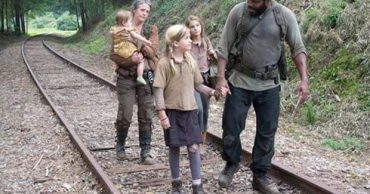
The Walking Dead‘s always better when it whittles itself down to a few characters and a single idea: and honestly, putting Alicia Witt in a room with Melissa McBride and Lauren Cohan, simply to examine two sides of the same coin, is the best idea The Walking Dead‘s had in quite some time. And it does so in some of the most effortlessly constructed storytelling Dead‘s ever had: it’s the rare “isolation” story that serves purpose in both present and future, building up the Negan mythology with a little Fight Club-ish touch while still paying plenty of attention to building out a harrowing, claustrophobic hour of television.
The only real flaw of “The Same Boat” is its dedication to a 42-minute running time: stripped down to a trim 35 minutes, “The Same Boat” could’ve been one of the show’s finest episodes, eliminating a lot of the inevitable buildup to the death of Paula, the Coughing Woman, and Lost My Finger Girl, which stretches a lot of its material thin across its expected running time. Ultimately, the setting of “The Same Boat” works against itself early on, but pays off in dividends later: where The Walking Dead struggles to find dimensions to the whole “look in the mirror” debate Carol silently (and slyly) engages herself with Paula in, it finds great power in the devastating third act, where Carol and Maggie’s survival instincts and unfortunate amount of practice kick into high gear, and they leave another bloody path of destruction in their wake.
Unfortunately, the longer “The Same Boat” spends on having Paula verbally dress down Maggie and Carol, the more the episode stretches its credibility. Knowing how Carol herself would really act in any given situation, does she really think telling Paula that Maggie’s pregnant is a great idea? There are a few moments of machination – Gordon from Banshee slapping Paula is another that sticks out – where The Walking Dead shows the lack of depth in its hand, which pushes itself to the limit when it delays the inevitable “showdown” until the episode’s final moments.
That being said, it’s still satisfying as hell to see Carol and Maggie survive: and it’s pretty frightening to see how quickly and casually they light an entire room of men on fire, leaving a half-dozen of charred bodies in their wake, only to be greeted by the image of Rick shooting a guy point-blank in the head when he goes all “His name is Robert Paulson” on the crew. Those final five or six minutes alone make the thin tension of the previous 36 completely worth it: the weight these women carry as they save their own asses offers The Walking Dead the rare opportunity to make incidental deaths of one-off characters meaningful – even if it comes in the familiar vein of “better us than them”, the growing unrest Carol and Maggie pull off their caper with begins to finally give voice to Carol’s character this season (and in a way, Morgan). The Walking Dead is asking just how far it can push its characters to the edge of complete damnation: and most importantly, “The Same Boat” finds the heart of that idea in Carol.
All season, Carol’s sudden shift as a character has been a struggle: while she shrugs at watching her bitchy neighbor get sliced into filet, and has no problem putting a few in the chest of the Wolf Denise was being held hostage by, she’s also shifted in questioning her behavior more, as if she wants to put her badass Terminus-destroying past behind her once and for all. And while the show’s ham-handedly explored this idea with Rick’s constantly-bloodied and angry face, or the nihilistic injury it deals Carl, Carol’s masterful manipulation and subsequent fight for survival creates quite a contradiction, one Paula so eloquently brings to light when she points out the Saviors might be the heroes of this story, and not our merry band of baby-having murderers.
That’s a strong thought The Walking Dead could never consider with The Governor, who arrived with zombie heads in tanks and a daughter on a leash: the show’s built up Negan’s presence and influence in an entirely different light (for the most part: the murder photos last week aren’t really the most promising sign), offering Rick and his group a view into the world of other people who are actually surviving, not clawing away at the edges of trying to build a civilization on top of a pile of bodies. Negan may rule with a brutal hand, but it’s an effective, driving one, a path that gives people purpose in a way that Rick’s never inspired: from that perspective, the slaughter they’ve enacted on Negan’s organized, sprawling community of people seems a lot closer to savagery than survival, giving immediate depth to the emotional transformation Carol’s had over the season.
Whether its a regression of her character or not depends on where the story goes: in the short-term, it’s turned her into an unsatisfying presence, but at least “The Same Boat” makes her changes necessary to evoke a certain emotional tenor for the show as a whole, which at least offers that her character is working in service of something beyond a simple plot device. As The Walking Dead gets louder and louder building to its Negan-revealing season finale, the philosophic dissonance between Rick and Carol/Morgan/etc. is going to be a major force of driving tension for the unseen retaliation we all know is coming: as The Walking Dead slowly lets the other shoe hit the floor, hopefully its themes and ideas from a scattered season will continue to fall into place, and redeem what’s been a wildly mixed bag of a season.
 Follow Us
Follow Us





Visitor Rating: 1 Stars